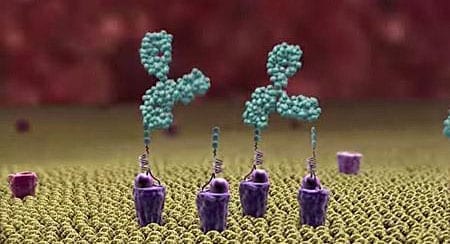Researchers at University of California, San Diego School of Medicine and Skaggs School of Pharmacy and Pharmaceutical Sciences report preliminary success testing a novel approach of tagging bacteria with a molecular “homing beacon” that attracts pre-existing antibodies to attack resistant pathogens.
The molecular homing beacon is the brainchild of study co-author and Nobel Laureate Kary Mullis, PhD, who invented polymerase chain reaction (PCR), a now-common lab technique used to replicate DNA.
One end of the homing beacon is made up of a DNA aptamer, a small piece of DNA that can be selected from a pool of billions of candidates based on its ability to bind tightly to a particular target.
In this test case, the aptamer specifically targeted group A Streptococcus, the bacteria that causes strep throat and invasive skin infections, while leaving human cells untouched. The other end of the homing beacon is alpha-Gal, a type of sugar molecule.
Humans naturally produce antibodies against alpha-Gal. That’s because alpha-Gal is foreign to humans. Other mammals and some microbes produce it. Humans have evolved antibodies against it when we eat meat or are exposed to alpha-Gal-generating microbes in our environment.
To test the homing beacon — or “Alphamer” — against live strep bacteria, Mullis enlisted the help of Victor Nizet, MD, professor of pediatrics and pharmacy at UC San Diego, whose laboratory studies how pathogens interact with the human immune system. The research team found that Alphamers not only bind strep and recruit anti-Gal antibodies to the bacterial surface, they also helps human immune cells engulf and kill the Alphamer-coated bacteria.
The study, published by the Journal of Molecular Medicine, offers the first proof-of-concept that Alphamers have the potential to specifically redirect pre-existing antibodies to bacteria and rapidly activate an antibacterial immune response.
“Our next step is to test Alphamers in animal models of infection with multidrug-resistant bacteria that pose a public health threat, such as MRSA,” said first author Sascha Kristian, PhD, visiting research scholar at UC San Diego and associate research director at Altermune Technologies, a company Mullis founded to develop Alphamers into unique therapeutics. “Meanwhile, we’ll also be tweaking the Alphamer to make it more potent and more resistant to degradation by the body.”
If Alphamers continue to show promise, researchers might be able to apply the same concept to attack any type of bacteria or virus, or perhaps even cancer cells.
“We’re picturing a future in which doctors have a case full of pathogen-specific Alphamers at their disposal,” Nizet said. “They see an infected patient, identify the causative bacteria and pull out the appropriate Alphamer to instantly enlist the support of the immune system in curing the infection.”



